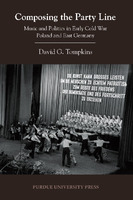Composing the Party Line
Music and Politics in Early Cold War Poland and East Germany
| dc.contributor.author | G. Tompkins, David | |
| dc.date.accessioned | 2018-06-27 23:55 | |
| dc.date.accessioned | 2014-12-31 23:55:55 | |
| dc.date.accessioned | 2019-11-28 17:04:08 | |
| dc.date.accessioned | 2020-04-01T14:47:29Z | |
| dc.date.available | 2020-04-01T14:47:29Z | |
| dc.date.issued | 2013 | |
| dc.identifier | 469621 | |
| dc.identifier | OCN: 867769201 | en_US |
| dc.identifier.uri | http://library.oapen.org/handle/20.500.12657/33461 | |
| dc.description.abstract | Examines the exercise of power in the Stalinist music world as well as the ways in which composers and ordinary people responded to it. A comparative inquiry into the relationship between music and politics in the German Democratic Republic and Poland from the aftermath of World War II through Stalin's death in 1953, concluding with the slow process of de-Stalinization in the mid-to-late 1990s. This book examines the exercise of power in the Stalinist music world as well as the ways in which composers and ordinary people responded to it. It presents a comparative inquiry into the relationship between music and politics in the German Democratic Republic and Poland from the aftermath of World War II through Stalin’s death in 1953, concluding with the slow process of de-Stalinization in the mid- to late-1950s. The author explores how the Communist parties in both countries expressed their attitudes to music of all kinds, and how composers, performers, and audiences cooperated with, resisted, and negotiated these suggestions and demands. Based on a deep analysis of the archival and contemporary published sources on state, party, and professional organizations concerned with musical life, Tompkins argues that music, as a significant part of cultural production in these countries, played a key role in instituting and maintaining the regimes of East Central Europe. As part of the Stalinist project to create and control a new socialist identity at the personal as well as collective level, the ruling parties in East Germany and Poland sought to saturate public space through the production of music. Politically effective ideas and symbols were introduced that furthered their attempts to, in the parlance of the day, “engineer the human soul.” Music also helped the Communist parties establish legitimacy. Extensive state support for musical life encouraged musical elites and audiences to accept the dominant position and political missions of these regimes. Party leaders invested considerable resources in the attempt to create an authorized musical language that would secure and maintain hegemony over the cultural and wider social worlds. The responses of composers and audiences ran the gamut from enthusiasm to suspicion, but indifference was not an option. This title was made Open Access by libraries from around the world through Knowledge Unlatched. | |
| dc.language | English | |
| dc.relation.ispartofseries | Central European Studies | |
| dc.subject.classification | thema EDItEUR::G Reference, Information and Interdisciplinary subjects::GT Interdisciplinary studies::GTM Regional / International studies | en_US |
| dc.subject.other | 20th century | |
| dc.subject.other | music | |
| dc.subject.other | history | |
| dc.subject.other | poland | |
| dc.subject.other | political aspects | |
| dc.subject.other | germany (east) | |
| dc.subject.other | East Germany | |
| dc.subject.other | Musicology | |
| dc.subject.other | Polish United Workers' Party | |
| dc.subject.other | Socialist realism | |
| dc.subject.other | Socialist Unity Party of Germany | |
| dc.subject.other | Soviet Union | |
| dc.title | Composing the Party Line | |
| dc.title.alternative | Music and Politics in Early Cold War Poland and East Germany | |
| dc.type | book | |
| oapen.identifier.doi | 10.5703/1288284315191 | |
| oapen.relation.isPublishedBy | 3600efb5-b3a3-419f-9e4f-7a6094096815 | |
| oapen.relation.isFundedBy | b818ba9d-2dd9-4fd7-a364-7f305aef7ee9 | |
| oapen.relation.isbn | 9781612492896;9781612492902;9781557537027 | |
| oapen.collection | Knowledge Unlatched (KU) | |
| oapen.pages | 312 | |
| oapen.place.publication | West Lafayette, IN | |
| oapen.grant.program | KU Pilot | |
| oapen.remark.public | Relevant Wikipedia pages: East Germany - https://en.wikipedia.org/wiki/East_Germany; Musicology - https://en.wikipedia.org/wiki/Musicology; Poland - https://en.wikipedia.org/wiki/Poland; Polish United Workers' Party - https://en.wikipedia.org/wiki/Polish_United_Workers%27_Party; Socialist realism - https://en.wikipedia.org/wiki/Socialist_realism; Socialist Unity Party of Germany - https://en.wikipedia.org/wiki/Socialist_Unity_Party_of_Germany; Soviet Union - https://en.wikipedia.org/wiki/Soviet_Union |

